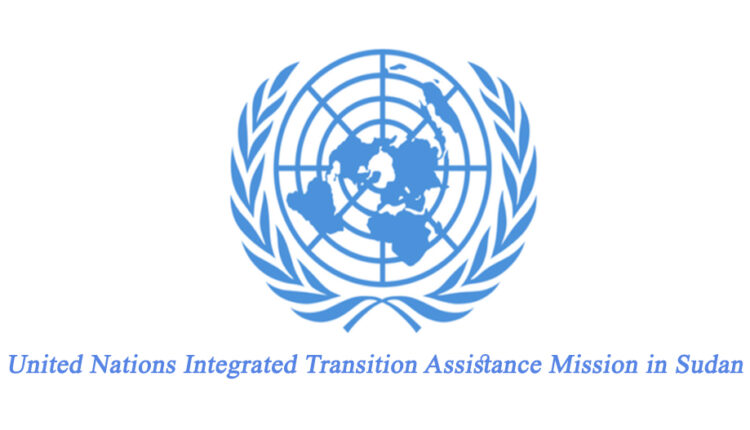DIRECTOR POLITICAL – UNITAMS
Job Description
| Department/Office: | United Nations Integrated Transition Assistance Mission in Sudan |
| Posting Title: | DIRECTOR, POLITICAL AFFAIRS, D2 |
| Job Code Title: | DIRECTOR, POLITICAL AFFAIRS |
| Duty Station: | KHARTOUM |
| Posting Period: | 22 January 2021 – 07 March 2021 |
| Job Opening Number: | 21-Political Affairs-UNITAMS-148737-D-Khartoum (M) |
| Staffing Exercise | N/A |
Org. Setting and Reporting
The position is located in the United Nations Integrated Transition Assistance Mission in Sudan (UNITAMS).
The United Nations Security Council adopted resolution 2524 (2020) authorizing the mandate of UNITAMS which is to assist the political transition, progress towards democratic governance, in the protection and promotion of human rights, and sustainable peace; support peace processes and implementation of future peace agreements; assist peacebuilding, civilian protection and rule of law, in particular in Blue Nile and South Kordofan (the Two Areas) and Darfur; and support the mobilisation of economic and development assistance and coordination of humanitarian assistance.
The position is based in Khartoum, Sudan and is located in the Office of Support to the Political Transition. The incumbent will report to the Special Representative of the Secretary-General.
Responsibilities
Within the limits of delegated authority, the Director, Political Affairs, will be responsible for performing the following duties:
Political Analysis and Advice:
•Identifies, analyses and monitors developments and emerging issues with respect to the implementation of UNITAMS’ mandate, in particular regarding the political transition and the peace process, in order to keep Mission leadership apprised;
•Assesses implications and makes recommendations to the Mission leadership on possible strategies, policies and other measures to address political issues of concern and to advance mandated objectives.
Good Offices:
•Engages or supports the SRSG and broader Mission leadership in their engagement with national and international stakeholders to facilitate mandate implementation, in particular efforts to support political and peace processes;
•Advocates and represents Mission views authoritatively and ensures that support to these processes proceeds in a coordinated and integrated manner.
Reporting:
•Ensures regular, timely and high-quality integrated political reporting and analysis
to the Mission leadership on issues pertaining to the mandate;
•Oversees the preparation of contextual information materials and reports to United Nations Headquarters;
Coordination:
•Develops and maintains collaborative relationships with national authorities, political and community leaders, civil society actors, the UN system and other national and international partners.
Management:
•Leads and oversees the activities of the Office of Support to the Political Transition, setting priorities within the Mission and with external stakeholders;
•Designs the implementation of the Office’s programme of work and determines priorities and activities that are in accordance with the mandate;
•Oversees managerial and administrative tasks, including preparation of budgets, assignment and monitoring of performance parameters and critical indicators, reporting on budget, preparation of inputs for the results-based budgeting process (RBB);
•Provides strategic guidance to the Office’s staff and participates in their evaluations.
Competencies
Professionalism: Ability to provide seasoned effective authoritative advice in a broad range of political issues to the Head of Mission, Headquarters and senior Mission staff; ability to identify and analyse the underlying causes of conflict and instability and to provide advice to senior officials in developing and implementing political strategies to address them; sound knowledge of the UN system; strong negotiation, consensus-building and conflict-resolution skills. Shows pride in work and achievements; demonstrates professional competence and mastery of subject matter; is conscientious and efficient in meeting commitments, observing deadlines and achieving results; is motivated by professional rather than personal concerns; shows persistence when faced with difficult problems or challenges; remains calm in stressful situations. Takes responsibility for incorporating gender perspectives and ensuring the equal participation of women and men in all areas of work.
Communication: Speaks and writes clearly and effectively; Listens to others, correctly interprets messages from others and responds appropriately; Asks questions to clarify and exhibits interest in having two-way communication; Tailors language, tone, style and format to match the audience; Demonstrates openness in sharing information and keeping people informed.
Creativity: Actively seeks to improve programmes or services; Offers new and different options to solve problems or meet client needs; Promotes and persuades others to consider new ideas; Takes calculated risks on new and unusual ideas; thinks “outside the box”; Takes an interest in new ideas and new ways of doing things; Is not bound by current thinking or traditional approaches.
Vision: Identifies strategic issues, opportunities and risks; Clearly communicates links between the Organization’s strategy and the work unit’s goals; Generates and communicates broad and compelling organizational direction, inspiring others to pursue that same direction; Conveys enthusiasm about future possibilities.
Judgement/ Decision-making: Identifies the key issues in a complex situation, and comes to the heart of the problem quickly; Gathers relevant information before making a decision; Considers positive and negative impacts of decisions prior to making them; Takes decisions with an eye to the impact on others and on the Organization; Proposes a course of action or makes a recommendation based on all available information; Checks assumptions against facts; Determines that the actions proposed will satisfy the expressed and underlying needs for the decision; Makes tough decisions when necessary.
Education
Advanced university Degree (Master’s degree or equivalent) in Political Science, International Relations, Social Science, Law or a related field. A first-level university degree in combination with two additional years of qualifying experience may be accepted, in lieu of the advanced university degree.
Work Experience
A minimum of fifteen (15) years of progressively responsible professional experience in political affairs, diplomacy, international relations, conflict resolution, or a related field is required.
A minimum of ten (10) years of experience in political outreach, facilitation, analysis and reporting is required.
Experience managing a large multi-functional team or office in a United Nations common system field operation (inclusive of peacekeeping, political missions and UN agencies, funds and programmes) or a comparable international organization in a conflict or post-conflict setting is required.
Experience working in Africa is required.
Experience supporting a peace process is desirable.
Experience in handling complex organizational issues at local and international level is desirable.
Experience in the United Nations system or a comparable international organization is desirable.
Languages
English and French are the working languages of the United Nations Secretariat. For the position advertised, fluency in English is required. Knowledge of Arabic is desirable.
Assessment
Evaluation of qualified candidates may include an assessment exercise which may be followed by competency-based interview.
Special Notice
The selected candidate is expected to start as soon as possible.
Please note that due to the ongoing situation with COVID-19 and the travel restrictions imposed by national authorities, selected candidates may be required to start the assignment/appointment remotely, in agreement with the hiring manager, and until further notice.
Applying to this job opening carries an expectation to accept the offer, if selected. The United Nations Secretariat is committed to achieving 50/50 gender balance in its staff. Female candidates are strongly encouraged to apply for this position. In this context, all staff are expected to move periodically to new functions in their careers in accordance with established rules and procedures. An impeccable record for integrity and professional ethical standards is essential.
United Nations Considerations
According to article 101, paragraph 3, of the Charter of the United Nations, the paramount consideration in the employment of the staff is the necessity of securing the highest standards of efficiency, competence, and integrity. Candidates will not be considered for employment with the United Nations if they have committed violations of international human rights law, violations of international humanitarian law, sexual exploitation, sexual abuse, or sexual harassment, or if there are reasonable grounds to believe that they have been involved in the commission of any of these acts. The term “sexual exploitation” means any actual or attempted abuse of a position of vulnerability, differential power, or trust, for sexual purposes, including, but not limited to, profiting monetarily, socially or politically from the sexual exploitation of another. The term “sexual abuse” means the actual or threatened physical intrusion of a sexual nature, whether by force or under unequal or coercive conditions. The term “sexual harassment” means any unwelcome conduct of a sexual nature that might reasonably be expected or be perceived to cause offence or humiliation, when such conduct interferes with work, is made a condition of employment or creates an intimidating, hostile or offensive work environment, and when the gravity of the conduct warrants the termination of the perpetrator’s working relationship. Candidates who have committed crimes other than minor traffic offences may not be considered for employment.
Due regard will be paid to the importance of recruiting the staff on as wide a geographical basis as possible. The United Nations places no restrictions on the eligibility of men and women to participate in any capacity and under conditions of equality in its principal and subsidiary organs. The United Nations Secretariat is a non-smoking environment.
The paramount consideration in the appointment, transfer, or promotion of staff shall be the necessity of securing the highest standards of efficiency, competence, and integrity. By accepting an offer of appointment, United Nations staff members are subject to the authority of the Secretary-General and assignment by him or her to any activities or offices of the United Nations in accordance with staff regulation 1.2 (c). In this context, all internationally recruited staff members shall be required to move periodically to discharge new functions within or across duty stations under conditions established by the Secretary-General.
Applicants are urged to follow carefully all instructions available in the online recruitment platform, inspira. For more detailed guidance, applicants may refer to the Manual for the Applicant, which can be accessed by clicking on “Manuals” hyper-link on the upper right side of the inspira account-holder homepage.
The evaluation of applicants will be conducted on the basis of the information submitted in the application according to the evaluation criteria of the job opening and the applicable internal legislations of the United Nations including the Charter of the United Nations, resolutions of the General Assembly, the Staff Regulations and Rules, administrative issuances and guidelines. Applicants must provide complete and accurate information pertaining to their personal profile and qualifications according to the instructions provided in inspira to be considered for the current job opening. No amendment, addition, deletion, revision or modification shall be made to applications that have been submitted. Candidates under serious consideration for selection will be subject to reference checks to verify the information provided in the application.
Job openings advertised on the Careers Portal will be removed at 11:59 p.m. (New York time) on the deadline date.
No Fee
THE UNITED NATIONS DOES NOT CHARGE A FEE AT ANY STAGE OF THE RECRUITMENT PROCESS (APPLICATION, INTERVIEW MEETING, PROCESSING, OR TRAINING). THE UNITED NATIONS DOES NOT CONCERN ITSELF WITH INFORMATION ON APPLICANTS’ BANK ACCOUNTS.


